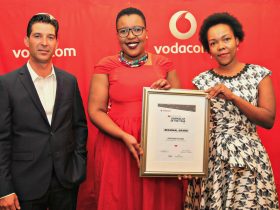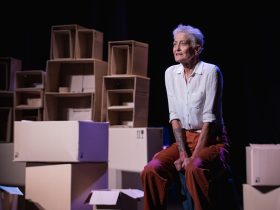Vuyokazi Majali was down and out, unemployed with little self-confidence and a lot of anger. Today, she is successfully self-employed in the informal sector, making a living and taking care of her family thanks to what she learnt through Taking Care of Business’ (TCB)’s Resell Programme.
Taking Care of Business (TCB) is a non-profit social enterprise that empowers unemployed South Africans to start their own businesses in the informal, circular economy. Teaching people how to become self-employed and escape the cycle of poverty. TCB’s tried and tested programme provides practical business and life skills that allow beneficiaries to build their self-esteem, save money, get out of debt and learn how to run a good business. Vuyokazi, who now has two stalls, one shop and two rental properties, is only one of the more than 1000 women a year who have the opportunity to radically change their lives.
Vuyokazi, a 45-year-old mother and grandmother from Kraaifontein says, “I learnt that when you’re at the bottom, you can only go up. Life was difficult. My parents are pensioners, and my children and grandchildren all depend on me. I was working at an insurance company but lost my job. Being older (I was 35), I struggled to find work again. I was unemployed for two years. I was staying alone in Cape Town and my kids were staying in Johannesburg because I couldn’t provide for them – I couldn’t even provide for myself,” she says.
She describes her life as she became more and more desperate. “I lost my dignity, and my kids lost their trust in me because whenever they asked me for something I couldn’t give it to them. I felt like I lost their love. I lost the respect of my community too because I had to ask my neighbours for things. I had to take credit at shops and from loan sharks to get by.
“I learnt exactly how many slices of bread were in a half loaf of bread as I was living off a few slices for breakfast, lunch and supper. I had a little bit of sunlight soap which I used as soap and as toothpaste. Then, eventually, I went two days without bathing. When I didn’t have toiletries then I knew it was getting worse. I felt so terrible. You cannot live without toiletries,” she says.
Then an opportunity arose and Vuyokazi grabbed it. “I got a R5 for airtime; I logged onto Facebook and I saw it: an ad for TCB’s Resell Programme Open Day. I had no food, no money, no way to get to the Paarl Open Day. Luckily at the train station, someone gave me money to travel, and I made it. Even the security guard at the TCB office park helped me with some money to go back home afterwards,” she says.
The Resell Programme teaches women to buy clothing at a reduced rate and sell it in their communities. TCB’s stock comes from large retail stores that donate their end-of-range or customer returns, instead of sending it to landfill.
“It was meant to be,” says Vuyokazi. “I always say ‘When something is yours, it’s yours and TCB is for me’. On my first purchase at TCB I bought shirts to give to those who helped me that day, to say thank you,” she says.
“Before joining TCB I was a shy and angry person because of my upbringing. My self-esteem was very low because I couldn’t afford to pay for anything. Through the programme I learnt to face and manage my anger. I had a lot of debt, and I learnt how to save and pay my debts. The mentoring and coaching classes helped me so much. TCB helped me understand myself,” she says.
“After just two months I could see the difference in my life. I was able to afford food and new clothes and give money to my children. I started gaining respect in the community. My attitude towards life has changed positively, my self-esteem has been boosted and restored and my potential has been unleashed. My children and my community trust me again,” she says.
“At TCB we learn discipline and consistency which leads to our businesses growing. Most importantly we have a positive attitude and teamwork skills. We learn how to adapt to all customer situations and become financially independent. I know how to save, keep my books and always budget before I spend – I never do credit anymore.
“Now, I have two stalls, one on a busy street in Wallacedene, as well as a shop in my house. There is a lot of competition, but I am confident in my business. I make sure I stand out and take pride in my display and packaging. Thanks to the retail partners of TCB who donate the clothing and homeware – I have good products to sell and can remain competitive in the market,” she says.
“Every month I buy R500 worth of sanitary pads, toiletries, toothpaste and roll-ons for the girl children. I make packages and give them away at my stalls to girls who need them. I know how terrible it is not to have toiletries.
“I’ve healed a lot. I’ve gained a lot and I’ve changed positively in my attitude to business and life in general. I am very grateful for being part of TCB. When you are at TCB you’ve got gold in your hands. My goal is to invest in property to leave a legacy for my children,” says Vuyokazi.
























Leave a Reply